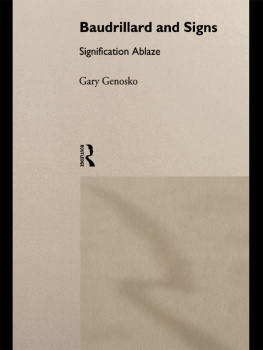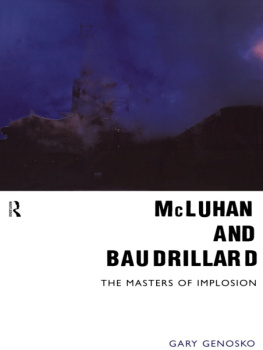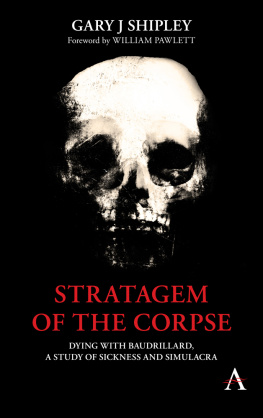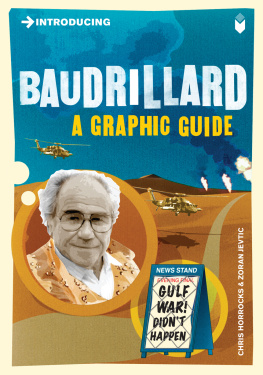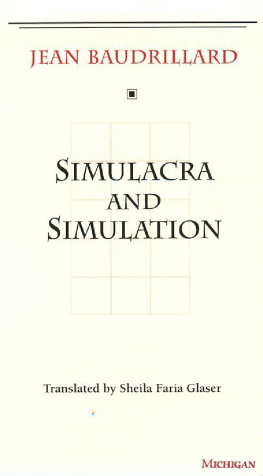Genosko Gary - Baudrillard and signs: signification ablaze
Here you can read online Genosko Gary - Baudrillard and signs: signification ablaze full text of the book (entire story) in english for free. Download pdf and epub, get meaning, cover and reviews about this ebook. City: London, year: 2005;2010, publisher: Routledge, genre: Romance novel. Description of the work, (preface) as well as reviews are available. Best literature library LitArk.com created for fans of good reading and offers a wide selection of genres:
Romance novel
Science fiction
Adventure
Detective
Science
History
Home and family
Prose
Art
Politics
Computer
Non-fiction
Religion
Business
Children
Humor
Choose a favorite category and find really read worthwhile books. Enjoy immersion in the world of imagination, feel the emotions of the characters or learn something new for yourself, make an fascinating discovery.
- Book:Baudrillard and signs: signification ablaze
- Author:
- Publisher:Routledge
- Genre:
- Year:2005;2010
- City:London
- Rating:5 / 5
- Favourites:Add to favourites
- Your mark:
- 100
- 1
- 2
- 3
- 4
- 5
Baudrillard and signs: signification ablaze: summary, description and annotation
We offer to read an annotation, description, summary or preface (depends on what the author of the book "Baudrillard and signs: signification ablaze" wrote himself). If you haven't found the necessary information about the book — write in the comments, we will try to find it.
Baudrillard and signs: signification ablaze — read online for free the complete book (whole text) full work
Below is the text of the book, divided by pages. System saving the place of the last page read, allows you to conveniently read the book "Baudrillard and signs: signification ablaze" online for free, without having to search again every time where you left off. Put a bookmark, and you can go to the page where you finished reading at any time.
Font size:
Interval:
Bookmark:

This book documents Baudrillards tempestuous encounters with semiology and structuralism. Genosko illuminates in detail his efforts to destroy structural analyses from the inside by setting signification ablaze with his concept of symbolic exchange. Simultaneously, the book shows that Baudrillards project to go beyond signification is fraught with difficulties which return him to a semiotic scene saturated with all kinds of signs. Through this illumination, Baudrillards work is situated in the broad spectrum of European and American semiotic traditions. His key concept of symbolic exchange is critically examined and is traced through its maturation and development over some thirty years of theorizing.
Also examined are Baudrillards engagements with and debts to French theatre and literature with reference to Antonin Artaud, Alfred Jarry and Victor Segalen. Discussion of Baudrillards relation to the thought of Deleuze, Guattari, Lacan, de Certeau and Lyotard casts light on many neglected features of his work.
Gary Genosko is Visiting Research Fellow, Department of Sociology, Goldsmiths College, University of London.

First published 1994
by Routledge
11 New Fetter Lane, London EC4P 4EE
This edition published in the Taylor & Francis e-Library, 2002.
Simultaneously published in the USA and Canada
by Routledge
29 West 35th Street, New York, NY 10001
1994 Gary Genosko
All rights reserved. No part of this book may be reprinted or reproduced or utilized in any form or by any electronic, mechanical, or other means, now known or hereafter invented, including photocopying and recording, or in any information storage or retrieval system, without permission in writing from the publishers.
British Library Cataloguing in Publication Data
A catalogue record for this book is available from the British Library.
ISBN 0-415-11256-7
ISBN 0-415-11257-5 (pbk)
Library of Congress Cataloging in Publication Data
Genosko, Gary.
Baudrillard and signs: signification ablaze/Gary Genosko.
p. cm.
Includes bibliographical references and index.
ISBN 0-415-11256-7 : $50.00ISBN 0-415-11257-5 (pbk.): $16.50
1. Baudrillard, JeanContributions in semiotics. 2. Semiotics.3. Structuralism. 4. FranceIntellectual life20th century.I. Title.
P85.B36G46 1994
302.2dc20
9349039
CIP
ISBN 0-203-20114-0 Master e-book ISBN
ISBN 0-203-20117-5 (Glassbook Format)
For Hannah
Two-sided physical sign, after Saussure
Hjelmslev in the polysemiotic field, after Guattari
Logics of value
The orders of simulacra
I began to think seriously about Baudrillard while I was a doctoral student in the Graduate Programme in Social and Political Thought at York University in Toronto, Canada. Sitting around the dining room table at John ONeills house during his Monday evening seminars was conducive to dispelling as much as distilling the theoretical fictions of Baudrillard. I would also like to thank loan Davies, with whom I have worked for many years on the editorial collective of Borderlines and who read an early version of this book, for his encouragement. I also wish to acknowledge the critical advice I received along the way from Brian Massumi, Brian Singer, Marie-Christine Leps, and Ray Morris. In addition, I have learned so much about semiotics from Paul Bouissac that a mere acknowledgement seems to diminish his contribution. Jean-Franois Ct helped me when Baudrillards French became overwhelming, and Baudrillard himself deserves mention for letting a virtual stranger into his apartment. Finally, this book could not have been completed without the support of my partner Rachel Ariss.
Much of my work on this book was made possible by awards from the Social Sciences and Humanities Research Council of Canada and the Queen Elizabeth II Fellowship Program in the Province of Ontario. Derrick de Kerckhove, Director of the McLuhan Program at the University of Toronto, and Chris Jenks, Deputy Head of the Department of Sociology at Goldsmiths College, University of London, both provided me with institutional, intellectual, and convivial social support while I was research fellow in both cities in 199293 and 199394 respectively.
Born at Reims in 1929, Jean Baudrillard has been active in French intellectual circles for thirty years. He began his career in the early 1960s as a book reviewer of German and Italian literature for Les temps modernes (Baudrillard, 1962, 1962a, 1962b; and Gane, 1991a:615). Trained as a Germanist, he translated into French major works by German playwright Peter Weiss, in addition to writings by Bertolt Brecht, social anthropologist Wilhelm E.Mhlmann, and Friedrich Engels, among others. Before the publication of his first major theoretical statement in Le Systme des objets in 1968, Baudrillard had produced a significant number of translations of quite diverse texts, many of which remain standard works. The bulk of his work in translation was in the area of theatre and, in particular, the revolutionary thtre-document of Weiss. Moreover, before his university career began, Baudrillard was a secondary school (enseignementsecondaire) teacher. He arrived in Paris at the Universit de Nanterre (Universit de Paris X) in 1966 and took up the position of assistant de Sociologie (assistant lecturer), a post in enseignement suprieur (university teaching) below that of Matre-assistant (junior lecturer), to which he rose in the early 1970s in the Facult des Lettres et Sciences Humaines at Nanterre. He retired from his teaching post in 1987.
From 1967 into the 1970s Baudrillard was associated with the sociology of urbanism group around the journal Utopie, and in 1975 he joined the founding editorial board of the cultural theory journal Traverses of the Centre Georges Pompidou in Paris. He withdrew from the latter journal in the late 1980s. Despite Baudrillards much
In 1975, together with Michel de Certeau, Gilbert Lascault, Marc Le Bot, Louis Marin and Paul Virilio, Baudrillard founded Traverses, although he did so without the clarity of vision which had helped to carry Utopie.Traverses was born from a kind of transversality, no longer a transgression, so as to regain a negativity of another type, one which was more interstitial, floating halfway in the institution. Significantly, Traverses is Beaubourg. But it is anti- Beaubourg as well (Baudrillard, 1983i: 32). Even though Traverses is still published, it has exhausted itself by enduring beyond its years, in Baudrillards estimation, since its play with collusion and the protection and cultivation of a scene is no longer tenable. If one has an interest in drawing a line between Baudrillards early and later works, I suggest that the articles contained in
Font size:
Interval:
Bookmark:
Similar books «Baudrillard and signs: signification ablaze»
Look at similar books to Baudrillard and signs: signification ablaze. We have selected literature similar in name and meaning in the hope of providing readers with more options to find new, interesting, not yet read works.
Discussion, reviews of the book Baudrillard and signs: signification ablaze and just readers' own opinions. Leave your comments, write what you think about the work, its meaning or the main characters. Specify what exactly you liked and what you didn't like, and why you think so.

